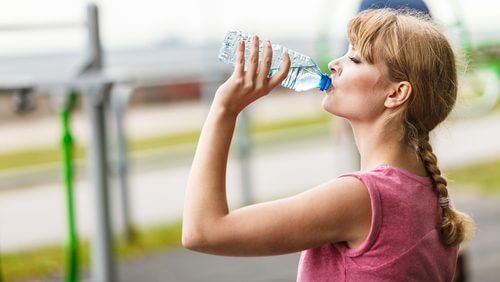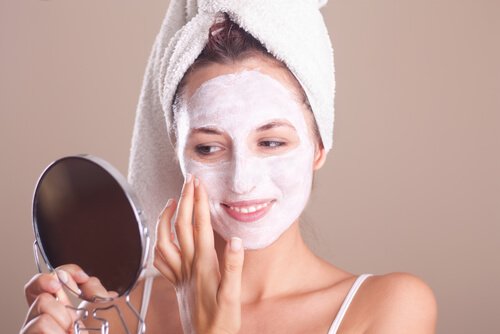How to Improve Your Skin During Menopause


Reviewed and approved by the doctor Karla Henríquez
Menopause is a stage of complex changes when women need to take care of many different aspects that are not just internal, but also external. The skin during menopause is one of the areas that can suffer the most, and is further weakened by the weather and climate.
In today’s article, we want to tell you how to improve and moisturize your skin during this time.
What happens to the skin during menopause?

With the passage of time, the dermis ages and its basic functions begin to be altered. These include regulating body temperature, defending you from the rays of the sun, protecting you from germs, and storing water and nutrients.
Although it depends on your genetics and general lifestyle, from age 50 and onward you’ll see the first signs of aging in the skin:
- Dryness
- Loose skin
- Rough texture
- Wrinkles
You’ll also notice a loss of firmness, changes in pigmentation, benign growths, and vascular problems.
- Your dermis will be less hydrated, which diminishes its ability to repair tissues and heal wounds.
- Because it also contains less collagen, your skin will be less elastic.
- Since the body produces fewer estrogen, the number of cells responsible for maintaining your skin tone decreases, causing spots to appear.
- The skin of the hands and soles of the feet becomes thicker and more cracks can form.
See also:
Skin care during menopause
You can regulate changes at the hormonal level through medical treatment.
There are certain habits, however, that women should modify or improve if they want to look more radiant and have fresh skin during this time.
Pay attention to the following tips:
Protect yourself from the sun
While UV rays can be harmful at any age, during menopause your skin is much less able to cope with them. You should always use a high protection factor sunscreen, especially during the middle of the day and in summer.
It’s also recommended to get 15 minutes of sun exposure during the day to adequately synthesize vitamin D. This improves your bone health by facilitating the absorption of calcium, for example.
If you are very fair-skinned, it’s best to always use sunscreen (even when it’s cloudy or cold).
Stay hydrated

If you don’t like it or get bored just drinking water, you can replace it with natural juices, fruit smoothies, and herbal teas. Coffee, soft drinks, and alcohol are not included in this list because they have the opposite effect.
It’s also a good idea to use a special moisturizing cream for your face and body. There are plenty of commercial products available for women in this stage of life. Apply them in the morning and at night.
Cleansing
Having good skin hygiene is fundamental to making you look younger and healthier.
You should wash your face using a natural soap that will keep the pH of your skin slightly alkaline and not alter the hydro-lipid barrier.
When you’re finished, apply a cream to protect your skin.
Never use friction when drying to avoid irritation.
Nourishment
In addition to using healthy creams for your skin, we also recommend that you eat a balanced diet. It should have a lot of vitamins, minerals, and antioxidants.
Fruits and vegetables will be your biggest allies, as they’re not only natural but are also full of water and nutrients.
Set aside the fats, flours, and sugars. Say no to processed or fast food. Instead, choose homemade, healthy, and seasonal ingredients.
This will provide your body with everything it needs to protect you from free radicals that can harm the health of your skin.
Exfoliate

You can use homemade masks that contain sugar and honey, for example. These will slow down the effects of time on your face and neck.
Get exercise
Physical activity is very important when it comes to keeping your skin radiant at any stage of life, but especially during menopause.
Getting exercise is essential for the elimination of toxins through your pores and increasing the elasticity of your skin.
As if that weren’t enough, exercise prevents osteoporosis, improves the health of your heart, reduces stress, and adds vitality.
Therefore, it’s essential to get some kind of exercise, even if it is calm and relaxed. If you usually don’t exercise much, start with some yoga, pilates, or swimming.
We recommend reading:
Yoga Helps Cure Depression
Eliminate unhealthy habits
Within this group we can target smoking, stress, and alcohol. All of these worsen your health and that in turn affects the state of your skin.
Smoking, for example, not only adds harmful toxins to your body but also prevents the dermis from regenerating itself and staying hydrated.
Stress goes hand in hand with other issues like insomnia, which cause dark circles and skin spots to form.
As for alcohol, it can have similar negative effects as those of smoking. This is because it adds toxins to your body that are harder to eliminate.
All cited sources were thoroughly reviewed by our team to ensure their quality, reliability, currency, and validity. The bibliography of this article was considered reliable and of academic or scientific accuracy.
- Ayers, B. N., Forshaw, M. J., & Hunter, M. S. (2011). The menopause. Psychologist. https://doi.org/10.1016/S0140-6736(98)05352-5
- Reid, R., Abramson, B. L., Blake, J., Desindes, S., Dodin, S., Johnston, S., … Soares, C. N. (2014). Managing Menopause. Journal of Obstetrics and Gynaecology Canada. https://doi.org/10.1016/S1701-2163(15)30487-4
- Ali, S. M., & Yosipovitch, G. (2013). Skin pH: From basic science to basic skin care. Acta Dermato-Venereologica. https://doi.org/10.2340/00015555-1531
- Gold, E. B. (2011). The Timing of the Age at Which Natural Menopause Occurs. Obstetrics and Gynecology Clinics of North America. https://doi.org/10.1016/j.ogc.2011.05.002
This text is provided for informational purposes only and does not replace consultation with a professional. If in doubt, consult your specialist.








